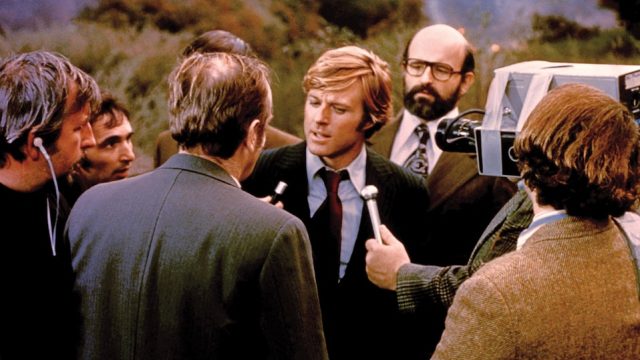This Week You Will Confront:
- political wonkery
- restored classic films
- discomfort with art
- Starfleet Academy admittance standards
- lava-lit genitalia
- Baltimore.
Thanks to Babalugats, Casper, scb0212, Ruck Cohlchez, and Miller for contributing this week, the FAR loves options. Send articles throughout the next week to ploughmanplods [at] gmail, post articles from the the past week below for discussion, and Have a Happy Friday!
The New Republic‘s Osita Nwanevu chronicles how American political movies have fallen “in love with cynicism and messaging” through four political works – Altman’s Tanner ’88, Ritchie’s The Candidate, Nichols’ Primary Colors and Soderbergh’s K-Street:
“Our lives are more and more determined by forces that overwhelm the individual,” McKay says in The Candidate—this is the first and last you hear of such forces in the film. Instead, the film inaugurates a tradition that misses the forest for the trees—critiques of political professionals that aggrandize them as the frustrating yet endlessly fascinating loci of all our problems. “Politics is bullshit,” one of McKay’s activist friends tells him early in the film. That may well be so, but the empty pageantry has a purpose. Our obsession with political hacks has encouraged the public to think about politics on the hacks’ terms; entirely too much time we might otherwise spend debating policies and values has been given over to trading superstitions about “electability” and “momentum.”
At Polygon, Tasha Robinson reports on the practical/digital effects mix in The Northman‘s naked volcano fight, that produced convincing lava and both hid and restored the actors’ genitalia:
At the same time, he wanted the audience focused on the primal, brutal nature of the fight, not on his actors’ anatomy. “I think if we had bits swinging around in the end fight, maybe that would have been distracting,” he says. “They were wearing thongs when we actually shot it, just for modesty. And safety. [laughs] And so we actually had to put CG genital enhancement in, to make them look less Ken doll-like. So while we’re having smoke make sure it’s always covering stuff, occasionally we needed to break away from the smoke and show some testicles really quickly, just to help keep the illusion alive.”
EQ features an interview with actor Josh Charles about returning to Baltimore for the new David Simon series We Own the City and – probably of interest to a certain strain of Soluters – his hesitation to rise to the occasion when interviewer Dave Holmes sets him up for Aaron Sorkin hagiography:
I mean, again, I think his stuff works incredibly well. I mean, it can. I personally think when it works best is when it’s in a film and there’s a director who’s checking it a little bit. I think that’s where Aaron’s stuff even sings more, when there’s a Fincher or a Warren Beatty or a Rob Reiner. What you’re saying is you feel like the actors are always having fun, and yes, I guess they are. It works in The West Wing to extraordinary degree. It’s fun to watch them have the wordplay. When you’re doing a steady diet of it I think it feels a little self-conscious to me, honestly. I find it very aware of itself.
Deadline reports that Martin Scorsese’s nonprofit The Film Foundation will launch a free virtual screening room to showcase restored films, staring with Powell and Pressberger’s I Know Where I’m Going!:
The lineup from co-curators Scorsese and Kent Jones includes Federico Fellini’s 1954 La Strada; G. Aravindan’s 1979 Indian film Kummatty; a film noir double feature of Detour (Edgar G. Ulmer, 1945) and The Chase (Arthur D. Ripley, 1946); Sambizanga (Angola, 1972, directed by Sarah Maldoror); One-Eyed Jacks (1961, directed by Marlon Brando); Moulin Rouge (John Huston, 1952); Lost Lost Lost (1976, by Jonas Mekas) and others TBA.
StarTrek.com brings us a compare and contrast of the higher education experiences of Wesley Crusher and Nog:
While Wesley does not earn admittance to the Academy on this first attempt, the testing process revealed the advantages of both his privileged position on the Enterprise and his status as a continuing-generation college student: a college student whose parents both attended higher education. […] Nog sees becoming a Starfleet officer as his best opportunity to avoid becoming an unsuccessful businessman like his father. However, Nog is unfamiliar with the customs and norms surrounding Starfleet and the Federation, and has to be informed that entrance into Starfleet isn’t done through apprenticing.
Jen Silverman writes at McDowell.org about her concern for moralizing receptions of uncomfortable art:
I am troubled by how often people talk about likability when they talk about art. I am troubled by how often our protagonists are supposed to live impeccable, sin-free lives, extolling the right virtues in the right order – when we, the audience, do not and never have, no matter what we perform for those around us. I am troubled by the word “problematic,” mostly because of how fundamentally undescriptive it is. Tell me that something is xenophobic, condescending, clichéd, unspeakably stupid, or some other constellation of descriptors. Then I will decide whether I agree, based on the intersection of that thing with my particular set of values and aesthetics. But by saying it is problematic you are saying that it constitutes or presents a problem, to which my first instinct is to reply: I hope so.

